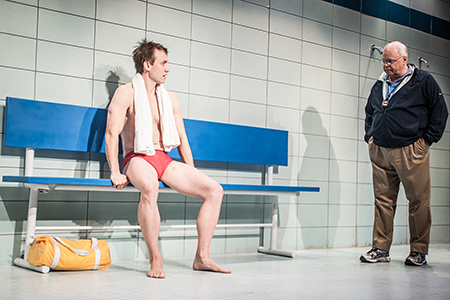Red Speedo

(© Teddy Wolff)
These days, sports heroes are almost as pretend as those who don masks and capes in the comic books, as a generation of sports fans has watched as their favorite athletes have been linked to steroids and other performance-enhancement drugs. Whether it’s Alex Rodriguez in baseball, Marion Jones in track, or Lance Armstrong in cycling, we now scoff at people we once admired.
The question of what’s wrong with an athlete taking a PED is explored in Lucas Hnath’s touching Red Speedo, a four-person play that makes its world premiere at The Studio Theatre as part of its Studio Lab program.
The story follows Ray, an Olympic-swimming hopeful who believes the only reason he has reached an elite level in the sport— defeating such notable names as Michael Phelps and Ryan Lochte in the process — is because of the “extra boost” he gets from taking an illegal substance.
Played sympathetically by Frank Boyd, Ray comes across more as a damaged kitten than as the vicious lion who the media makes these athletes appear to be. Ray makes a convincing argument that he’s not cheating because he’s evil; it’s just that swimming is all he knows, and without it, he has nothing. It’s sad, really, and the script makes you feel for his plight.
The play opens with Ray’s older brother, Peter, a lawyer and self-appointed representative for his little bro, pleading with Ray’s longtime swim coach not to go public with the news that a banned substance was found in the team’s fridge. Neither knows the drugs belong to Ray — in fact the blame has been put on a second-tier swimmer who has no hope of Olympic fame and fortune — but Peter is worried that even a whiff of scandal could hurt a huge endorsement deal he has arranged with Speedo on his brother’s behalf.
Thomas Jay Ryan plays Peter as part slimy lawyer, part caring friend, but you’re never quite sure if anything he’s doing is for the good of his brother or simply to help his own wallet and self-interests. At one point in the play, Peter appears to put his brother’s life in danger, simply to keep the Speedo deal intact, further adding to the villainous nature of the role.
Perhaps Hnath is making the point that it’s not really the athletes who are at fault for their substance-abuse indiscretions, but the people and situations around him or her. This is further displayed in the role of Ray’s coach, who at first seems unwilling to go along with any cover-up, but by the play’s end, rather than get Ray the help he needs, is willing to sacrifice his morals if it means more money and attention to his swim club. The switch in character seems a little abrasive, and while Harry A. Winter plays the role of caring coach to a tee, he’s less believable when he seems to have been pulled to the dark side.
Rounding out the cast is Laura C. Harris as Ray’s ex-girlfriend and one-time drug dealer, Lydia. The character has lost her license due to some illegal actions on her part, but also because of some improper involvement from Peter on the case against her. Harris has great chemistry with Boyd and brings a great range to a person who generally cares for her ex but has an inner passion for wanting revenge on his brother.
Hnath is known for writing dialogue with all the pauses and interruptions of everyday conversations and while in theory this back-and-forth works well for this script, the pacing is off at several times so you have actors halting dialogue mid-sentence without the requisite opposing comment coming in time. That’s a kink that director Lila Neugebauer needs to work out.
Mimi Lien’s tiled locker room-based set offers a behind-the-scenes look at just about any swim meet in the country — complete with showers, and while it works for the interactions of the three men, an important scene between Ray and Lydia scene seems a bit out of place here.
At 80 minutes, the one-act Red Speedo offers several laughs, an honest look at sibling rivalry and a comment about the behind-the-sport damage illegal substances can have. It may even have you rethinking your stance on athletes who cheat.











